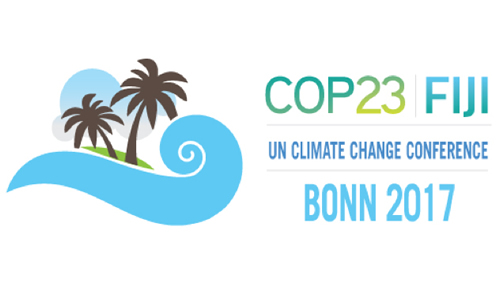 The African Union Commission (AUC) has called on Africans attending the ongoing UN Conference of Parties (COP23) underway in Bonn, Germany, to push for an outcome of concrete treaty that would ensure long-term financing for climate change.
The African Union Commission (AUC) has called on Africans attending the ongoing UN Conference of Parties (COP23) underway in Bonn, Germany, to push for an outcome of concrete treaty that would ensure long-term financing for climate change.
That financing, the AU noted, during the Africa Day event, held along-side COP23, should also help Africa to implement its Nationally Determined Contributions (NDCs) and also implement the Paris Agreement.
Speaking on behalf of Mr Moussa Faki Mahamat, the Chairperson of the African Union, Mrs Josefa Leonel Correia Sacko, Commissioner for Rural Economy and Agriculture, AUC, urged all stakeholders to ensure the operationalisation of the 100,000 billion dollars per year from 2020 and other resources for developing countries in the implementation of the Paris Agreement.
“Africa also needs to stand for unconditional access to climate finance and mechanism for all countries that have no historic responsibility for climate change,” Mrs Sacko said.
She said the continent needed to embark on the development and adoption of clean technology but without being compelled to mitigate climate change.
“Africa needs a robust capacity building programme to enable the continent to build resilience, the Continent also need to put in more efforts in disaster risk reduction, especially those associated with climate change as they are on the increase”.
The AU also asked Africa to really implement the Paris Agreement, since the cost of climate change was unaffordable for the continent.
Mrs Sacko, however, announced that through the support of the European Union, Africa was implementing the continental programme on disaster risk reduction, as well as working together with the EU for support in the implementation of NDCs and on global climate framework service in Africa.
“However, there is the need for more and stronger partnership engagement with closer international cooperation to help African countries to effectively deliver on their commitment,” she said.
Mrs Sacko called for the strengthening of North, South, and South-South cooperation in the implementation of the Paris Agreement.
The Africa day event was a very important part of the yearly COP, which helped in enhancing Africa’s position and clarity of interest in the climate negotiation process.
The AU Commission in collaboration with the NEPAD Planning and Coordinating Agency; the African Development Bank; and the UN Economic Commission for Africa in partnership with the Central African region’s Economic Committee for the Central Africa States; Gabon, Congo; and DRC, jointly organized the Africa Day side event to showcase the best practices and African priorities at COP 23.
The theme of the Africa day was: “Partnership for the Implementation of Paris Agreement: Africa’s response.”
The main objective of the African Day event was to provide a platform and an opportunity to share ideas on the nature and effectiveness of partnership needed for accelerated implementation of the Paris Agreement in Africa with a focus on the implementation.
More specifically, the Africa Day seeks to outline Africa’s priorities for the implementation of the NDCs in the context of the Paris Agreement; and review the implications and prospects for the implementation of the NDCs for Africa, including associated opportunities for enhanced partnerships with both public and private sectors to scale up climate action in Africa.
It also created a platform for open conversation on issues related to the need for partnership to mobilize means of implementation for NDCs to support African countries’ national development strategies that were inclusive and aligned to climate-resilient and low carbon transition.
It also provided a platform to debate on the existing partnership opportunities for NDCs’ financing in Africa, in the context of the Paris Agreement and of SDGs in Africa.
In attendance, were President Denis Sassuo Nguesso of Congo and President Alpha Conde of the Republic of Guinea, who doubles as the Chairperson of the African Union, as well as some African Ministers of States, technocrats, civil society activists, African observers, negotiators, and parties as well as the media.
The UN climate summit COP23 in Bonn that opened on Monday November 7, gradually draws to a close on Friday November 17, as delegates entered the last stretch of the two-week conference.
Source: GNA























